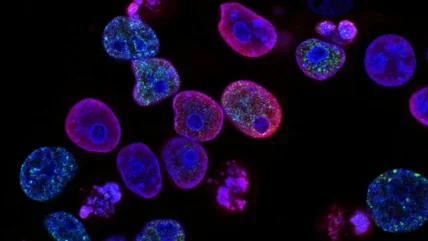
Adaptimmune Therapeutics has received the US Food and Drug Administration (FDA) accelerated approval for Tecelra (afamitresgene autoleucel) to treat a type of solid tumour.
Tecelra is a genetically modified autologous T-cell immunotherapy that targets melanoma-associated antigen A4 (MAGE-A4).
The gene therapy is indicated for adults with unresectable or metastatic synovial sarcoma who are HLA-positive and whose tumour expresses the MAGE-A4 antigen as determined by FDA-approved companion diagnostic devices.
US FDA approved the indication under its accelerated approval pathway, based on the overall response rate and duration of response.
The health agency may grant continued approval for this indication contingent upon verification and description of clinical benefit in a confirmatory trial.
Tecelra is the first engineered cell therapy for a solid tumour cancer approved in the US, and the first new therapy option in more than a decade for synovial sarcoma, said Adaptimmune.
Adaptimmune CEO Adrian Rawcliffe said: “The approval of Tecelra is a momentous step in Adaptimmune’s journey to redefine the way cancer is treated and the culmination of a decade of groundbreaking R&D.
“I want to thank the patients, caregivers, investigators, and clinical teams as well as everyone at Adaptimmune and our partners who made possible this watershed moment for cell therapy and for people with synovial sarcoma.
“We are committed to advancing our robust clinical pipeline to serve more patients in need and plan to progress lete-cel, the next late-stage investigational treatment in our sarcoma franchise, with a rolling BLA submission to the FDA next year.”
The FDA approval of Tecelra was based on the results of the SPEARHEAD-1 (Cohort 1) clinical trial in 44 patients, which resulted in an ORR of 43% with a complete response rate of 4.5%.
The major efficacy outcome of the clinical study was the overall response rate (ORR), determined by independent review and supported by the duration of response.
In the study, the most common adverse reactions include nausea, vomiting, fatigue, infections, fever, constipation, dyspnea, abdominal pain, non-cardiac chest pain, decreased appetite, tachycardia, back pain, hypotension, diarrhoea and oedema, among others.
SPEARHEAD Trial Principal Investigator Sandra D’Angelo said: “Tecelra (afami-cel), which uses each patient’s immune cells to recognize and attack their cancer cells in a one-time infusion treatment, is significantly different than the current standards of care for advanced synovial sarcoma.
“This approval represents a much-needed new option for people diagnosed with this sarcoma and an important milestone for the use of cell therapies in solid tumour cancers.”
The treatment with Tecelra required prior biomarker tests for human leukocyte antigens (HLA) type and melanoma-associated antigen A4 (MAGE-A4) tumour expression.
Adaptimmune has teamed up with Agilent Technologies to provide a companion diagnostic for the MAGE-A4 biomarker, dubbed MAGE-A4 IHC 1F9 pharmDx.
US FDA has also approved MAGE-A4 IHC 1F9 pharmDx as a diagnostic tool to help identify patients with synovial sarcoma who may be eligible for treatment with TECELRA.
Furthermore, Adaptimmune has partnered with Thermo Fisher Scientific to expand the labelling of the latter’s SeCoreTM CDx HLA-A Locus Sequencing System to include Tecelra.






